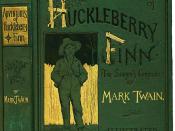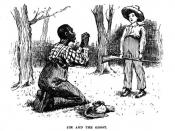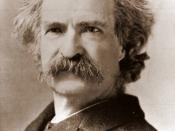Since its publication, The Adventures of Huckleberry Finn, written by Mark Twain, has been challenged for a variety of reasons. Many schools have struggled in attempting to teach the book and several aspects of the novel seem inappropriate. For instance, some may agree that the use of the racial slur, nigger, HuckÃÂs rebellion against religion, and the inaccurate portrayal of the South are all reasons why the book should not be taught. There is also the issue of racial tension; the book may be hard to teach in certain environments, particularly the South. I do acknowledge these points, however, we must face our past to conquer our fears, despite the great difficulty. If the book is taught properly, and is experienced and not simply read, then the book is truly understood.
The Adventures of Huckleberry Finn is one of the most banned books in American history; most of the people who want to ban the book simply have not read it or donÃÂt understand the message behind it.
One of the arguments against the book is the almost excessive use of the racial slur, nigger, which is written 212 times. Many readers, particularly African-Americans, take offense to this and label Huck Finn a racist book. However, we must remember that this book takes place in the south twenty years before the Civil War; it would be unrealistic if the slur werenÃÂt used. At the time, the word nigger, which is used merely as a synonym for slave, was appropriate for the setting the time.
Another issue is that the slur could create racial tension, especially if it was read aloud. Many students may feel insulted, especially if they are African-American. If the book is taught in an environment where African-Americans are the minority, they may feel singled out.



The Controversy of Huck Finn
I am not certain that I would label this a great essay. On the other hand, it is certainly a good essay, and I appreciate the thoughtful consideration of a wide range of issues, and the very solid writing that it presents. Well done.
0 out of 0 people found this comment useful.